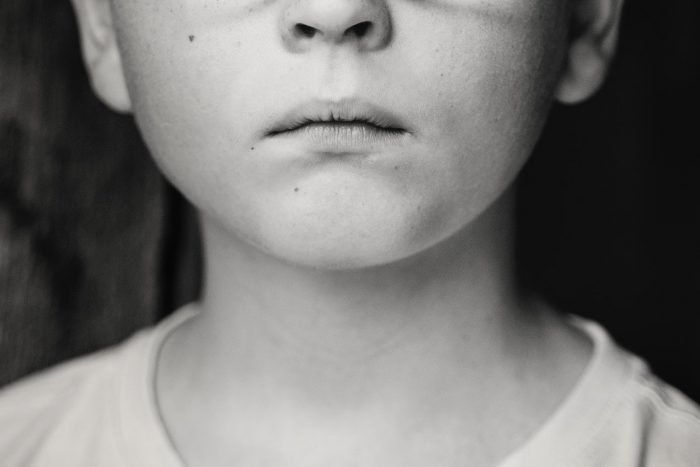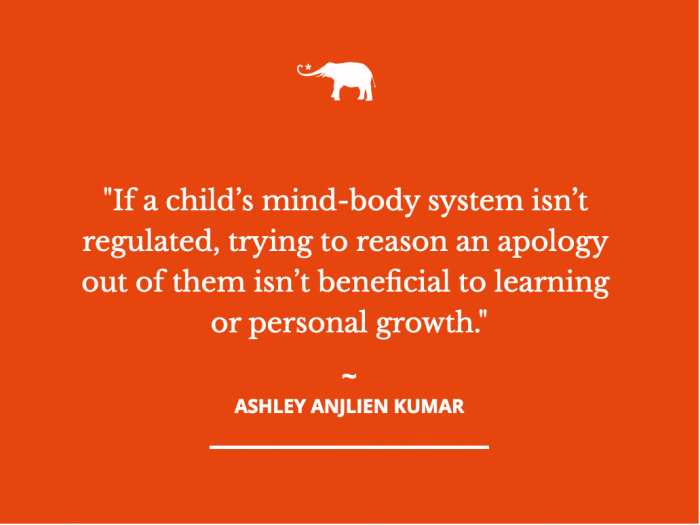You’re watching your seven-year-old playing at the park.
She gets frustrated because she can’t summon the courage to get across the monkey bars. She flops onto the sand as frustration escapes from her lips through a roaring grunt-type of sound. She kicks the sand. The sand flies up and on to another child playing nearby.
You instantly stand and shout, “Celina, why did you do that? We don’t kick sand on other people!”
You go over to the other child and ask if she’s okay. The girl looks at you in shock as she blinks sand out of her eyes. Your inner temperature is rising along with some shame, embarrassment, and guilt.
You turn to your child and demand, “Say sorry!”
Your daughter screams in further frustration, “Arrrggghhhh!”
You are even more outraged she won’t say sorry, but you lower your voice and get serious, “Say sorry now, Celina. We don’t do that to other people.”
Some things could happen now:
- Your child screams, “Sorryyyyy!” and stomps away.
- Your child screams at you, “Noooooo,” and stomps away.
- Your child just cries in frustration, and you pull her away from the situation.
- Any other way this could go?
You’re a parent. You want your child to grow up with manners, care, and courtesy toward others. She should not treat others this way. I get that.
I also assume you’re a parent who wants your child to have care and courtesy toward themselves too. In other words, to develop self-love, high self-esteem, self-confidence, and self-understanding.
Demanding our child to say sorry backfires.
Here are seven things to consider:
1. A demand is a threat to the child’s autonomy. Did you notice that from the time a child figures out how to walk/run and talk, they really seek independence and autonomy? “I wanna do it!” (my way) becomes a common phrase in a toddler/preschooler’s life. And if you try to do it for the child or even help, you get a slap to the wrist or a full-blown emotional meltdown. Independence and autonomy are core human needs. So when we place a demand on another person, rather than a request, we end up negatively impacting this core need.
You’re an adult with a fully matured brain versus your child with a still-developing brain—now imagine yourself in your workplace. You screw up on a project and your boss comes in and starts demanding an apology, “Say sorry,” she says to you as she stands there and you sit at your desk. What feelings might you have? Embarrassment? Shame? Frustration? Would your face get a little hot, maybe red?
You’re being forced to say sorry in this way. No one is attempting to understand you, the mistake that you made, or why/how it happened. Your needs to be understood and supported are not being met in this instance.
Now your child, whose brain doesn’t mature until age 25-plus—can you imagine what they feel?
2. Kids have big emotions and aren’t always able to communicate them. As parents, we have to become good guessers. What was your child feeling when she roar-grunted? How about when she kicked the sand? Would you probably have a similar reaction if you were frustrated?
Maybe you can self-regulate more because you’re an adult, but our children don’t learn to self-regulate on their own. They co-regulate with attuned caregivers. This means they learn self-regulation from the influence of a self-regulated adult who cares for them.
The younger the child, the less adept they are at actually being able to say, “I feel _____.” P.S. How many adults do you know who can clearly state their feelings? Is it reasonable for us to expect our kids to?
A key component to helping children is to practice emotional intelligence skills and coping tools.
You can talk about feelings throughout your day with your kids—talking about your own feelings and guessing or asking what they might be feeling. Have you heard the phrase “name it to tame it?” That’s what we’re doing here.
Breathing exercises and sensory calming tools are essential too. I posted on my Instagram recently that finding your child’s dominant sensory system is crucial for reducing your own overwhelm and stress as a parent and for your child’s ability to cope.
As your kids evolve, their sensory preferences will change too.
3. The amygdala hijacks the mind-body system, and the nervous system responds to a perceived threat. In item number one above, I indicated that a demand is a threat to your child’s autonomy. When the brain perceives a threat, evolution has groomed our nervous system to respond accordingly (fight, flight, freeze).
Remember, the child brain is still immature and does not reason the way an adult brain does—hence our kids’ nervous systems are far less primed for self-regulation than a mature adult who has learned about mind-body connection to some extent and implemented strategies or techniques to cope with big emotions.
When the nervous system is activated into fight, flight, or freeze mode, we see it in our child’s behavior: the scream is the fight response, and the stomp away is the flight response (so you may have a little bit of both). If our child was to simply shut down and become quiet when we raised our voice, or if the other child roared her voice back at your child and your child froze in their tracks from the terror, they’d be in freeze.
Children who experience trauma from which they cannot escape will have a more obvious freeze response; for example, a child witnessing domestic violence but having nowhere to go to get away from the chaos could develop a freeze response.
When the amygdala is activated in this way, the rational reasoning part of the brain shuts off. This is technically a good thing! Because back when sabretooth tigers were roaming about, it wasn’t time to think rationally and reason; it was time to run or fight. There is far less chance of your child doing anything reasonable or rational when their emotions are heightened (such as delivering a genuine apology).
4. Simply demanding our child to say sorry without understanding them first impacts their self-understanding and self-worth. If our caregivers didn’t give a hoot about why we were frustrated—they didn’t see us, hear us, or attempt to understand us—then we feel “not seen, not heard, and not understood.” If instantly our caregivers wanted to control our behavior or have us change it, it impacted our self-perception.
Simply focusing on the behavior without understanding the feeling or needs behind the behavior puts us in the losing scenario with our kids in the long run. Behind every behavior is a need, and behind every negative behavior is an unmet need.
We can practice something called “non-violent communication” to create a connection with our child in the moment instead.
Here’s how this might flow for you and your child (just an example):
She kicks the sand, and it gets on the other child…you go over to the other child and say, “Oh my gosh, I saw you got sand on you from that kick, are you okay?”
The child may need reassurance, “I’m going to talk with her, okay, and I’ll be right back, okay?” (Indicating toward your child.)
Addressing your child, aside and calmly:
You: “Celina, I noticed you seemed really frustrated when you were playing on the monkey bars. Am I right?”
Child: “Hmm.” (Yes.)
You: “Were you having some trouble getting across?”
Child: “Yeah…I can’t believe I still can’t do it.”
You: “I get it, honey. I used to have trouble getting across the monkey bars, too; gosh, were they challenging. I totally understand how frustrating that feels. I saw that you kicked the sand when you got frustrated.”
Now offer an empathic, loving touch or calming sensory tool (offering a hug may be helpful if your child is receptive to it, but may feel counterintuitive to you as a parent—we’ll tackle that in a moment). At this point, your child’s emotions might be diffusing a bit.
You: “I’d love to help if you’d be open to working on it together?”
Child: “Yeah, okay, mom,” or, “Nah, I just wanna go home now.”
You: “I hear you. But before we go, when you kicked the sand, it got all over this little girl. I think it went in her hair and face. That probably didn’t feel pleasant for her. Would you be willing to apologize?”
Since your child has been acknowledged and validated, she’s likely in a more rational state of mind and comes right over to apologize. She may not have even realized she got sand on the other girl because the rational reasoning part of the brain was “offline” when that happened.
Does this take more time than barking a demand? Yes, it does. Anything worthwhile takes effort and often a bit more time.
Your child may or may not want to apologize depending on her level of nervous system activation at the time. And that’s okay! Why? Because if your child is still activated, her rational brain is still turned off, so the idea of an apology doesn’t even fit her inner-world scenario yet.
Waiting until she has calmed down (regulated her system) and then approaching her again with the idea of an apology will likely go smoother.
If it works out, your child can apologize before leaving the park to go home.
Worst case, she doesn’t apologize. You, as her regulated parent, can apologize on her behalf. Why is this important? And should you have to apologize for your child’s behavior? No, you shouldn’t have to apologize for anyone’s behavior. But if we put aside our “me-ness” in the moment and think of the child impacted by the negative behavior, an apology will go a long way for that child. Apologies can smooth over the rough edges of negative feelings that sprout from negative actions/reactions.
Your child also gets to see you apologize and lead by example.
Later at home, when your child is more regulated, you can bring up this conversation casually without judgemental tones, and offer a chance to teach empathy. Asking questions such as how the other child might have felt? How might she (your child) have felt in the situation if the same thing happened to her? Would an apology help everyone feel better? What do we gain from an apology? What do we lose from an apology?
5. The three R’s: Regulate, Relate, Reason. Bruce Perry’s “Three R’s” is a great resource. Keeping in mind that without regulating, trying to cajole an unauthentic apology does both parties a disservice in the long run. Child number one feels unheard, unseen, and not understood while she encounters a personal challenge. Child number two feels confused and wondering why she should deserve a kick of sand to her face. Both children need tending to.
But if a child’s mind-body system isn’t regulated, trying to reason an apology out of them isn’t beneficial to learning or personal growth.
6. It’s not bad manners to not apologize. In various parenting groups, I have read posts of parents saying that if your kid doesn’t apologize, it’s bad manners. “Bad manners” is a judgement. Okay, so based on some unwritten set of invisible laws that governs our children and society, somehow our child has bad manners if they don’t apologize once? Is that 100 percent true?
Or is the truth that your child had a challenge, reacted based on her nervous system being activated, and made an unhealthy choice? Doesn’t everyone do this? If not daily, at least weekly, we mess up and react to things that happen to us as adults, don’t we? So why are we holding our kids to a higher standard than ourselves?
7. When we force apologies, over time, we undermine self-worth, self-esteem, and self-confidence. When a child feels unseen, unheard, and not understood, and then on top of that is being forced to apologize for something, several things can happen:
>> Apologies feel like punishments. If we demand our kids give an apology when they do something “bad,” then it will feel like a punishment to them. This defeats the genuine connection-building purpose of an apology. If you think about it, that’s what happened to many of us. Doesn’t saying sorry to someone today bring up some shame or guilt, and you’d rather not have to say sorry if you didn’t have to? When an apology feels like a punishment, then the amygdala activates again, and people become defensive. I’ve seen this time and again. Saying sorry comes with a level of vulnerability, and that is uncomfortable for many people—only because of the life experiences they had, particularly in childhood, around the idea of giving and receiving apologies.
>> They don’t mean it. If this pattern is repeated throughout the child’s life, they grow up giving apologies that are half-hearted at best. Because of this, they don’t develop adequate empathy skills. And according to research, empathy is a skill that is universally lacking in most fully grown adults today.
>> They build up resentment—to others or toward their parents who weren’t able to understand them. They do not “feel felt” (to feel felt is to experience empathy). Resentment can be expressed in even more negative behaviors: lashing out, hurting others physically, and so on. Empathy can be learned by experiencing it ourselves. We can teach our kids empathy skills by giving them our empathy.
>> They start to diminish the worth of their own life experiences and emotions. “My emotions don’t matter. Nobody understands me.”
>> They can doubt others. Can they really trust others? Or are they going to be thrown under the bus again if something goes wrong?
>> They can start to doubt themselves. Since their emotions or life experiences weren’t given attention or validity, they start to doubt even mundane choices in life—like which flavour ice cream to choose—because they have a hard time determining their feelings.
>> They can become appeasers and people pleasers. Saying things just for the sake of keeping the peace and suppressing their genuine feelings and needs.
In conclusion, there are many factors at play when it comes to apologies, but so far, no evidence indicates that forcing them or demanding them is helpful to the long-term emotional wellness and growth of a child.
Happy Parenting, my friends.
~


 Share on bsky
Share on bsky






Read 2 comments and reply